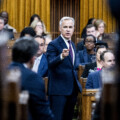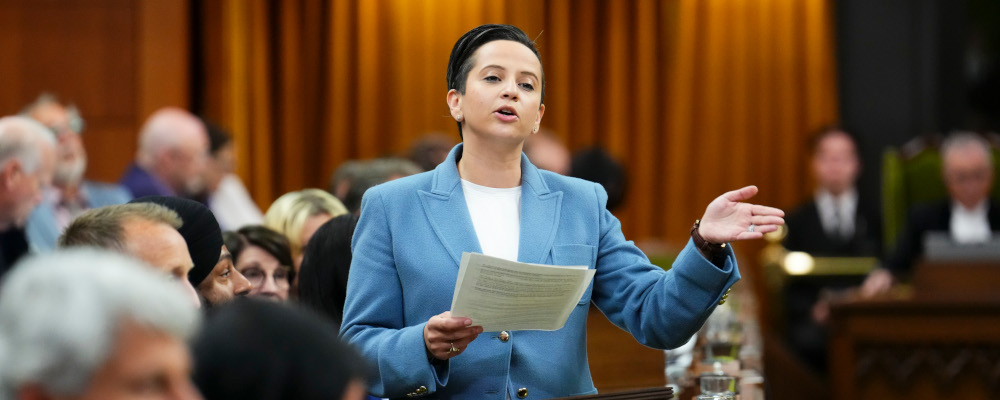Recently, Karina Gould, the Trudeau government’s newly appointed government house leader, was asked about her goals for the House of Commons. She was quick to point to her desire to make question period something to “be proud of.”
The minister’s comments obviously imply the sense that the current version of Question Period is not something we can be proud of. In this view she is not alone. Her suggestion that it sets a bad example for children is practically a cliché at this point, a common lament in countless columns decrying the decay of politics from what was presumably some golden age of parliamentary decorum to the present more disappointing politics of 2023.
However, having spent many years observing QP (as it’s sometimes referred to in Ottawa) in my past life as a political staffer, working on both the government and opposition sides, I think that many of these critiques fail to grapple with why it has actual value for the governance of Canada, and as a result why so many proposed “reforms” would, in fact, reduce the value that it offers to Canadians.
It is easy to see why a cabinet member would have complaints. In government, the whole exercise can be an annoyance. The questions from the opposition often feel unfair, misleading, or self-contradicting (and sometimes are in fact all three). And for ministers and their staff, QP sucks up a significant amount of their time pulling them away from what might seem to be more productive uses of their time.
And if you understand QP purely by watching it as an outsider, you may find these complaints have some validity. It’s undeniable that there is quite a lot of variation in the quality of the questioning and answering that occurs each day. Having watched literally hundreds of such sessions I would never suggest that each QP session is a high point of rhetoric or debate.
But before we start trying to re-invent QP it is important to see the bigger picture of the role that it plays in our governance. This means paying less attention to the spectacle and understanding the broader role it plays in forcing a government to work harder to address issues.
The key to understanding this reality is to recognize that QP is the most effective tool the opposition has in its mission to hold the government accountable on a regular basis. The government has vastly more resources available to try to set the daily agenda with an order of magnitude more staff and the ever-larger resources of the bureaucracy. But every day Parliament sits for 45 minutes, during which ministers (or their substitutes) are forced to respond to whatever the opposition wants to talk about. And it’s the one part of the day that a significant number of people tune in and actually watch what is happening.
This gets at the way that QP has a much broader impact in terms of accountability and agenda-setting than the show that happens in chamber. As I noted, QP, to the frustration of some members of the government, plays an oversized role in the life of a cabinet minister. Each minister will have a staffer who wakes up at some early hour to identify and try to get a handle on any new issues that might end up as a question that day. This often requires first seeking to get information from the department about what actually happened before the staffer can brief his or her minister or the prime minister’s office about what should actually be said.
And crucially, ministers will look not just to have an answer but to have an actual solution to the problem. That’s because the best answer to an opposition question is to be able to point out that in fact the government has already solved it. This is why it’s not uncommon to see last-minute press conferences or scrums happen an hour or two before QP where a minister will try to get ahead of some problem of the day by unveiling a response even before an opposition MP has a chance to rise with his or her questions. The possibility that a minister may have to answer for something invariably drives all kinds of behind-the-scenes action even if the topic never ultimately makes it to the floor of the Commons.
Now perhaps in an ideal world ministers would work just as hard without the pressure of QP out of their profound commitment to good governance, but the reality of this world is that even the most idealistic ministers (and perhaps especially them) need pressure to stay on top of files. The nature of responsible government is that ministers are supposed to be accountable for everything that happens in what can be vast ministerial portfolios. What Question Period does is create a simple pressure point that forces the government to act with a speed that it would not follow if left to its own devices.
And so, this gets us to the practical problems with essentially all the common ideas for reforming QP that are regularly floated. Basically all would have the practical effect of making it more comfortable for a minister. Yet given that the key value of QP is forcing ministers to act by making them uncomfortable, that means that most reforms would in fact undermine rather than strengthen it and its contribution to accountability.
This becomes obvious when we start considering how various ideas would play out. For instance, one top criticism is the issue noted by Minister Gould—that is, the idea that all the heckling, clapping, and general noise is unseemly and embarrassing to watch. Yet the noise is part and parcel of the pressure that it puts on the government. A nice, polite exchange in a silent House would be a more pleasant experience for the government—but it would not make for better government.
This is not to say that there isn’t a danger that the noise and tumult reach a point that is out of control and start to undermine the value of QP, but that’s for the Speaker to manage in his or her capacity as a referee who is expected to permit the House to be boisterous with a firm-but-not-too-narrow hand.

Another popular complaint is that the 30-second limit for questions and answers encourages a dumbing down of rhetoric. It is argued that if participants had more time they would be able to give more nuanced or sophisticated takes. Sadly, this feels like a very naïve view. I’m quite sure that in most cases if a minister had an additional 30 seconds he or she would simply use the time to rattle off even more transiently related talking points rather than nuance. And in general, most questions are already longer than they need to be to be most effective. As it is, the short time limit offers effective communicators a chance to distill a point down to its essence.
The final issue of contention that comes up frequently is that the party leadership teams shouldn’t be the ones who get to choose the QP lineup each day. Rather than the parties submitting a list of their lineup each day, the Speaker should spontaneously choose who gets each question. While this appeals to a more romantic sense of Parliament, it fundamentally misunderstands how the choice of the opposition lineup can strategically drive the pressure on an issue. As most recently seen during the sessions dominated by questions about foreign interference, QP allows the opposition to keep the pressure up when the government is trying to wait out a controversy. It is no coincidence that the government was able to stall on calling a public inquiry over the summer when it’s not facing daily QP, or that the inquiry was finally announced just a couple of weeks before MPs returned and the government would have to explain the holdup.
This is not to say that there are no changes to QP that might be beneficial. It might, for instance, be useful to limit the government’s ability to choose which minister responds to an incoming question. This allows the responsible minister to avoid having to answer for something that has gone wrong. But this or any change ought to be made only after careful consideration.
Canada’s system of responsible government is not a utopian model but rather the creation of literally centuries of learned experience. It is premised on the idea that government works best when it faces vigorous challenges at every turn. This premise is worth defending against schemes of improvement that would seek to turn away from that tradition.
QP may not be perfect, but that’s the wrong measure. Notwithstanding its imperfections, it’s still worth preserving as a tool of government accountability.
Recommended for You

How Canada built, then broke, the world’s best immigration system

Can the new Defence Investment Agency fix Canada’s procurement problems—or will politics slow that down too?

The unceded advantage: Alberta and Saskatchewan’s case for tit-for-tat federalism

‘Resigned to mediocrity’: Mayoral-hopeful Brad Bradford on why Toronto is failing and why he thinks he can fix it



